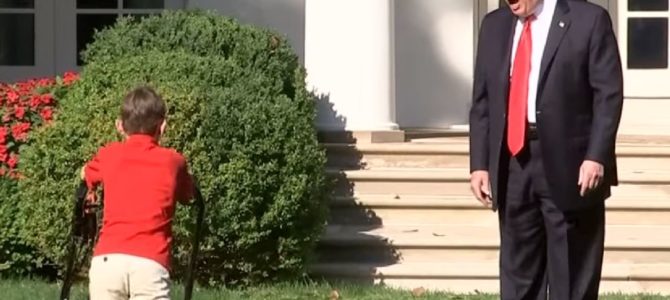Eleven-year-old Frank “FX” Giaccio sent a letter to the White House asking if he could mow the lawn there. On Friday, he got his wish, mowing the Rose Garden and getting a tour of the White House. He also met President Donald Trump and Vice President Mike Pence.
This story was so delightful that only someone with a heart of stone could frown upon it. Steven Greenhouse, The New York Times‘ former labor reporter, is that man. (Will it surprise you to learn that The New York Times‘ former labor reporter has decidedly liberal views on labor? No, it will not.)
Press Secretary Sarah Sanders tweeted out a picture and update on Frank:

Greenhouse wrote a series of tweets lambasting the mowing of lawns by an 11-year-old:

Greenhouse went on to tweet a bunch more, saying that he’d written a lot about child labor and that the American Academy of Pediatrics says you should be 12 before operating a mower. (Fun fact: this same academy also recommended that parents talk to their children about Donald Trump’s election victory, so they can avoid long-term psychological trauma from it.)
Greenhouse also responded to the tsunami-level of feedback he received by calling people “snowflakes” having a “meltdown” for his views against Frank, the lawn-mowing kid. He kept linking to a study showing that young kids can be injured by accidentally touching hot lawnmowers, and that kids who are bystanders can be hit by projectiles launched from mowers. Bystanders, this study claimed, were four times as likely to be injured by a lawn mower as an operator.
On Sunday, Greenhouse tweeted out a 2012 story about a kid who got seriously injured when his 16-year-old brother tried to fix a lawn mower that had jammed.
None of this surprised me because I live in a city with people who share Greenhouse’s views. When some kids tried to get their lawnmowing business started, my neighbors worried about their age, the presence of pesticides on some lawns, and the lack of steel-tipped boots.
In an article I wrote four years ago, I noted that adolescence requires some risk-taking, that reasonable risk-taking can help stave off drug abuse or other dangerous behavior, and the primary and secondary benefits of such entrepreneurship should factor in as well:
Look, I’m a mother. I care deeply about my children’s safety. But safety is just one important thing to teach our children. And it’s not even anywhere near the most important thing. Keeping your kids from dying or getting hurt is of secondary importance to teaching them how to live. Safety isn’t even a virtue. If you’re teaching your kids more about safety than you are about honesty, kindness, respect for others, responsibility, gratitude, integrity, cooperation, determination, social skills, enthusiasm, compassion and manners, you’re doing it wrong.
Incidentally, a great way to learn some of those virtues is by encouraging them to mow a neighbor’s lawn.
So kudos to Frank — who wore solid shoes, protective eye gear, and ear plugs — for learning to spend his adolescence wisely and productively. And safely! As for child labor concerns, come on. I mean, really, come on.
This kid is not working 12 hours a day in a textile factory. His work schedule — he currently mows “two and a half” lawns– is certainly not conflicting with school or family obligations. I met this kid on Saturday in the Fox News greenroom, one of many TV stations he visited. He is polite, confident, and quirky. His entrepreneurship is to be commended, not blocked via regulatory burdens.
In America, kids this age have begun mowing lawns for money for decades. This is, in fact, the stereotypical way that suburban children begin earning money before they get a work permit. Kids should not be discouraged from this.
In fact, the bigger problem is that too many kids are not being given opportunities to develop work habits, engage with different generations, or learn basic life skills. These things help kids navigate through the more realistic dangers they will face, including inability to make appropriate decisions in the face of risk, lack of initiative, economic doldrums, and loneliness.
Through his initiative in sending a letter to the White House, his entrepreneurship at a young age, his diligence at his work, prudent use of safety equipment, and his good attitude, Frank is modeling excellent behavior at a young age. And he did a nice job.










